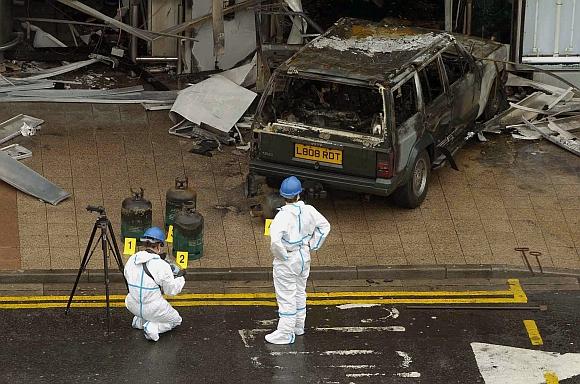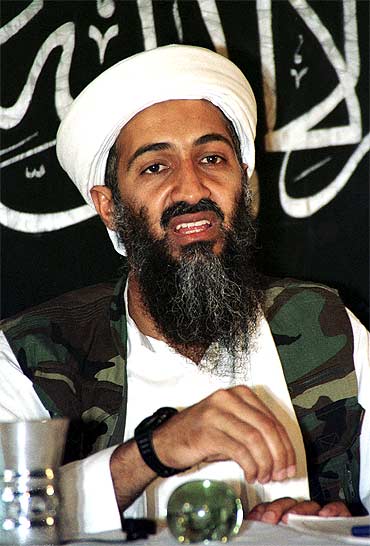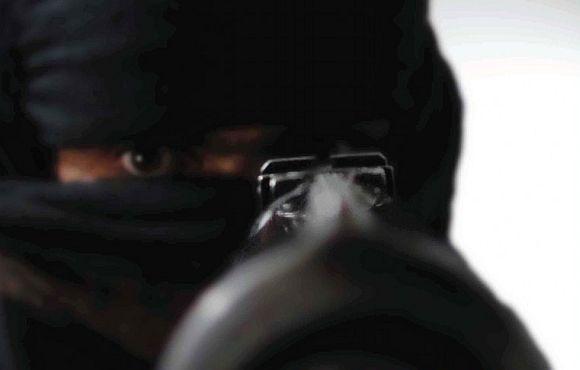Photographs: Mark Runnacles/Reuters Vicky Nanjappa
There have been a lot of incidents involving educated terrorists, but off late, the trend of rising self-motivated groups is becoming a cause of growing concern, says Vicky Nanjappa
The case of Kafeel Ahmed, who drove a jeep into the Glasgow airport terminal in 2007, and set it ablaze or even the recent assassination plot which was busted in Bengaluru has raised concerns among security agencies.
Interestingly, these persons were not associated with any known terror group and decided to carry out an act of terror on their own. This means that they arranged for the finances by themselves, planned out the operation and decided to execute it with no help of any organisation.
This issue is now being constantly studied by the intelligence agencies and police forces with the help of experts specialising in social science. This trend has opened a can of worms for security agencies.
...
'They work alone'
Image: Image for representation onlyThe biggest problem is that there is no database on such youth. Since there are no calls to track, and no otherwise links with any known terrorist groups, it becomes next to impossible to pick up any clue of the operation.
More often than not these youth have been busted because of an error on their part. One could argue that both the cases (Kafeel and the recent Bengaluru plot), the operations were not entirely successful. This is only due to inexperience.
"There is a blood rush among these boys which makes them hurry up an operation. They do not work with handlers who otherwise would guide and monitor them, and so, at the last minute they often tend to falter. However, there is always a danger that other such groups may quickly learn from their mistakes," said an agency source. There is no social stigma attached to them.
...
What motivates these youths?
Image: Osama bin LadenPhotographs: Reuters
Information is so easy to get today and it is splashed all over the web. Groups such as the Lashkar-e-Tayiba, the Indian Mujahideen and the al Qaeda have managed to put up a lot of information on websites, which is easily accessible.
The manner in which an Anwar Alwaki (al Qaeda recruiter, now dead) or a Hafiz Saeed (Jamat-ul Dawa chief) or Osama Bin Laden would speak is extremely motivating for these youth. To make matters worse, these groups have intentionally put out misleading material online.
There is this constant nagging that they are minorities and need to fight for their rights. Social scientists would say that only a small percentage take to such crimes. In most of the cases that have been studied, these youths have had perfect childhoods, good education and good upbringing.
"There is no social stigma attached to them, but somewhere deep down it is noticed that they are insecure or have this urge to do something about a problem that they are made to believe is there. Many feel that by doing so they would be called heroes if they stood up for a cause. And in doing so, they take one of the most dangerous decisions of their lives," says an expert.
...
'The terror has always been there'
Image: Image for representation onlyFormer Research and Analysis Wing chief C D Sahay says that the 'educated terrorist' concept of is being flagged by the IB and the media now, but it has always been present.
"One needs to realise that both bin Laden and Saeed had an eye for such 'talent'. They looked for educated people like scientists so that they could create the 'dirty bomb'. They knew for a fact that an educated terrorist would have less heat on him -- he would be able to travel with ease; would fly aircraft, would be proficient in funds transfer; decode messages on the internet and would know about breaking cyber security," he says.
Saeed who initially started to build his network through radical Muslims in Pakistan also realised the need to have an educated network. As long as they were dependant on their radical links, they were restricted to Kashmir alone. However, post 9/11, the thinking changed and they started roping in educated persons and as a result of this their reach grew ten-fold.
"It is worrying that highly educated people are taking to terrorism. These kind of individual operations are difficult to track and if it is left to grow then it could cause havoc," says an Intelligence Bureau source.
...
The men and their professions
Image: Image for representation onlyKafeel Ahmed, the accused in the Glasgow plot, is a doctor. Mansoor Peerbhoy is a techie from Pune, Peedical Abdul and Yahya Kamakutty are both techies from Bengaluru, Jaffer Iqbal Sholapur is a doctor from Hubli and Muthur Rehman, a journalist from Bengaluru -- all self-radicalised men.
They were all well-off had a good upbringing and had no history of abuse of atrocities against them. While some may have been brainwashed, a majority of them took to terrorism on their own by reading material on the internet.
"It is a difficult scenario," says a police official. "The organisations ought to keep a thorough check on the activities of each of their employees and there ought to be a network within to monitor such persons. Some of the employees of the above mentioned persons have said after their arrest that they had very strong views about certain issues," he says.
"When something of this sort is noticed, it is pertinent that they inform us so that we can set up a watch and the danger could be averted," he concludes.
TOP photo features of the week
...






article